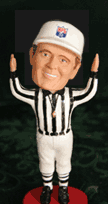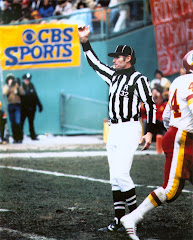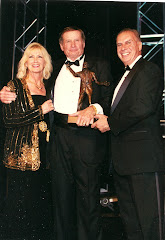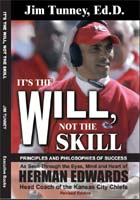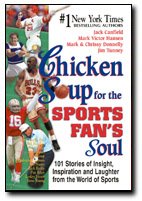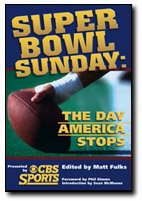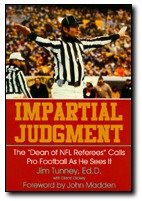On the Tunney Side of the Street #196, September 29, 2008
After Further Review …The “Encore Effect,” a recently released book, authored by my good friend and colleague, Mark Sanborn (http://www.marksanborn.com/), describes how we all want an encore performance. Every performer enjoys the recognition of an extraordinary performance. Sanborn (book available at www.theencoreeffect.com) isn’t saying ‘great’ or ‘excellent’ – he’s saying it’s a REMARKABLE performance that creates the encore effect.
The lessons in this book will either remind you or teach you how to give a remarkable performance in anything you do. Anything? Yes! Whether you are in sales, management, parenthood, teaching - anything! And why not? What is the value in what you do, if it is not done with a goal of “remarkable”?
As a life-long educator, I have often thought about remarkable performances in teaching. Can it be done on a daily basis? How often do teachers get an “S.O.” (standing ovation) at the close of a remarkable lesson or even at the end of the day? As a professional speaker, I strive to give a remarkable performance every time I am on the platform. Remarkable performances result in the encore effect – i.e. attendees want to hear more from you.
As an NFL referee, I also strived for a remarkable performance every game. I asked myself “Did I leave the game today better than I found it?” Players, coaches and fans demand that! It is often said that the best officiated game is one in which no one notices “who” they are. Let me argue that. In order for officials to ensure the integrity of the game, their performance needs to be “remarkable.” You want those officials back.
This brings me to NFL referee #85 Ed Hochuli, who has distinguished himself for 19 seasons (http://en.wikipedia.org/wiki/Ed_Hochuli). Players, coaches, and fans want him back. I won’t take the time to revisit a decision he made in a recent game that was incorrect and not in keeping with his remarkable NFL tenure. No one is more devastated at his miscall than #85 himself. What makes this a remarkable situation is what Hochuli did following that call.
“After further review” and realizing his error, Hochuli spoke to Chargers Head Coach Norv Turner and said, “Coach, I blew it. It was my mistake.” This is in keeping with Hochuli’s philosophy of “just doing the right thing.” Admitting his error (in front of 70,000+ fans and many millions watching on television) puts his performance in the “remarkable” category. (http://www.football-refs.com/)
Will you strive for a remarkable performance in everything you do?
For more information about Jim Tunney, please visit his website:
www.JimTunney.com, or if you would like to respond to this message,
please send your email to Jim@JimTunney.com
Friday, September 26, 2008
Sunday, September 21, 2008
On The Tunney Side of the Street #195, Sept. 22, 2008 (www.JimTunney.com)
On the Tunney Side of the Street #195, September 22, 2008
After Further Review … Stephen Covey, author of “Seven Habits of Effective People,” and “The 8th Habit: from Effectiveness to Greatness,” teaches three guidelines for effective collaboration – read: TEAMWORK. http://www.stephencovey.com/
They are: 1) Establish your mission; 2) Set the ground rules; and 3) Identify each member’s strengths. Nothing new here. However, it recalled for me how the NFL officiating crew of seven, of which I was the “crew chief,” strived to be more effective (read: Perfect) on the field every game. See how these apply to you and how you can utilize them each day.
1) Establish your mission. My book “Impartial Judgment” could have been titled “’Cause I Don’t Care Who Wins.” http://www.jimtunney.com/products.html. The mission of each NFL crew is to officiate all 60 minutes of every game without prejudice and mistake-free! Does this put extra pressure on each member of the crew? Not necessarily. Pressure keeps one focused and can be managed when every one is prepared – mentally and physically. The questions are: a) did each one do his homework thoroughly by studying the Rule Book? And b) did everyone physically workout each day to be in game conditioning?
2) Set the ground rules. Each week, before the next game, every official – by himself, as well as with his crew, studies the game film of their previous week’s game looking for ways to improve. Each crew member must be honest to admit a blown call, a missed play, and that he was in the right position to make the call (called mechanics). Only when officials learn from their mistakes will improvement take place. These ground rules help the crew seek perfection. Another important ground rule is to be professional on the field, friendly and courteous, but not “buddy, buddy” with players or coaches.
3) Identify each member’s strengths. It is vital that each official is placed in an on-field position e.g. R, U, HL, LJ, SJ, FJ or BJ, which utilizes his physical and mental strengths to the utmost. While the major responsibility of enforcing the penalty for a foul, for example, is placed on the referee (white hat), it is essential for the effectiveness of the crew, and of course, for the game itself that every official learn, know and ensure that every penalty is properly enforced. And finally, while the strength of a crew depends on the strength of the individual, it is the willingness of each to help another T.E.A.M. member. Teamwork – call it chemistry – is crucial to the success of the game.
Will you practice these suggestions to help your T.E.A.M. move from effectiveness to greatness?
For more information about Jim Tunney, please visit his website:
www.JimTunney.com, or if you would like to respond to this message,
please send your email to Jim@JimTunney.com
Labels:
effectiveness,
greatness,
leadership,
mission,
Stephen Covey,
TEAM,
teamwork
Friday, September 12, 2008
On The Tunney Side of the Street #194, Sept. 15, 2008 (www.JimTunney.com)
After Further Review… Does fan behavior determine the outcome of a game? Does it influence the performance of an athlete? Should fans only cheer (read: Encourage) their team and not ‘boo’ or cast disparaging remarks towards a player or team? Is there a limit as to how far fan behavior can or should go?
Many of these questions arose with the recent announcement that Tennessee Titans’ starting quarterback #10 Vince Young (http://www.10vinceyoung.com/) was “hurting inside and out” and doesn’t want to play football anymore. Young, in his third season with the Titans after being the third pick in the 2006 Draft, was expected to lead the Titans to the Super Bowl. What happened?
Late in the Titans’ (http://www.titansonline.com/) opening game against the Jacksonville Jaguars, Young scrambled, was tackled, and sprained his left knee. Before the injury, Young was booed loudly after throwing two interceptions, even though the Titans eventually won 17-10. That emotional damage appeared to affect Young more than the revelation that the MRI on his knee showed a “sprained medial collateral ligament.” Young has since reconsidered and rejoined the team, pledging his full commitment to the Titans (http://www.skysports.com/story/0,19528,12118_4135869,00.html) .
Some athletes handle booing/jeering, etc. better than others. Fans have always expressed their dissatisfaction with performances that they feel are not in keeping with their expectations (read: Winning). Fans don’t want to lose. Neither do players. Players always want to give their best performance. Someone has to lose. Fans don’t accept that, thus the booing.
As an NFL referee for 31 years, I have been booed many, many times. Whether it was on a foul called – or not called – fans took out their displeasure by booing. On more than one occasion fans have thrown bottles, cans, snowballs, etc. venting their displeasure. Fan behavior became so violent a few years ago at Philadelphia’s Veterans Stadium (http://www.philadelphiaeagles.com/) , where the Eagles play, that a Civil Court Judge was placed in the bowels of the stadium and out-of-control fans were adjudicated and sentenced right on the spot.
Actually, I have found that a team playing ‘on the road’ away from home has less difficulty with booing than playing at home. A team on the road may get booed during player or team introductions, but often no one player is singled out. If a visiting quarterback throws an interception, the home team crowd doesn’t boo – they cheer!
So how does any player rebound from the booing of fans? Coaches and teammates play a vital role, at any level – Little League to professional – to help an athlete bounce back from abhorrent fan behavior. Thus, the word T.E.A.M. means just that -- Together Everyone Accomplishes More.
Will you be supportive of a teammate who is having a bad day?
For more information about Jim Tunney, please visit his website:
www.JimTunney.com, or if you would like to respond to this message,
please send your email to Jim@JimTunney.com
A new book, “The Encore Effect,” by author/speaker Mark Sanborn, now available
For more information, visit: www.MarkSanborn.com/moreencores
Many of these questions arose with the recent announcement that Tennessee Titans’ starting quarterback #10 Vince Young (http://www.10vinceyoung.com/) was “hurting inside and out” and doesn’t want to play football anymore. Young, in his third season with the Titans after being the third pick in the 2006 Draft, was expected to lead the Titans to the Super Bowl. What happened?
Late in the Titans’ (http://www.titansonline.com/) opening game against the Jacksonville Jaguars, Young scrambled, was tackled, and sprained his left knee. Before the injury, Young was booed loudly after throwing two interceptions, even though the Titans eventually won 17-10. That emotional damage appeared to affect Young more than the revelation that the MRI on his knee showed a “sprained medial collateral ligament.” Young has since reconsidered and rejoined the team, pledging his full commitment to the Titans (http://www.skysports.com/story/0,19528,12118_4135869,00.html) .
Some athletes handle booing/jeering, etc. better than others. Fans have always expressed their dissatisfaction with performances that they feel are not in keeping with their expectations (read: Winning). Fans don’t want to lose. Neither do players. Players always want to give their best performance. Someone has to lose. Fans don’t accept that, thus the booing.
As an NFL referee for 31 years, I have been booed many, many times. Whether it was on a foul called – or not called – fans took out their displeasure by booing. On more than one occasion fans have thrown bottles, cans, snowballs, etc. venting their displeasure. Fan behavior became so violent a few years ago at Philadelphia’s Veterans Stadium (http://www.philadelphiaeagles.com/) , where the Eagles play, that a Civil Court Judge was placed in the bowels of the stadium and out-of-control fans were adjudicated and sentenced right on the spot.
Actually, I have found that a team playing ‘on the road’ away from home has less difficulty with booing than playing at home. A team on the road may get booed during player or team introductions, but often no one player is singled out. If a visiting quarterback throws an interception, the home team crowd doesn’t boo – they cheer!
So how does any player rebound from the booing of fans? Coaches and teammates play a vital role, at any level – Little League to professional – to help an athlete bounce back from abhorrent fan behavior. Thus, the word T.E.A.M. means just that -- Together Everyone Accomplishes More.
Will you be supportive of a teammate who is having a bad day?
For more information about Jim Tunney, please visit his website:
www.JimTunney.com, or if you would like to respond to this message,
please send your email to Jim@JimTunney.com
A new book, “The Encore Effect,” by author/speaker Mark Sanborn, now available
For more information, visit: www.MarkSanborn.com/moreencores
Labels:
behavior,
booing,
emotional damage,
fans,
Tennesse Titans,
Vince Young
Friday, September 5, 2008
On The Tunney Side of the Street #193, Sept. 8, 2008 (www.JimTunney.com)
On The Tunney Side of the Street #193, Sept. 8, 2008 (www.JimTunney.com)
As I watched Head Coach Herm Edwards (Http://www.kcchiefs.com/coach/herman_edwards/) address the Kansas City Chiefs’ Team after they defeated the St. Louis Rams in their last pre-season game, the word LEADER came to mind. I was watching a leader do best what a leader does best.
First and foremost, Coach Edwards congratulated them (as a team) for their victory. He made specific references to 3 or 4 things they did well. Then he constructively pointed out things that needed more work. And finally, the Coach said that this week was ‘cut down’ time as the NFL requires that a team can only keep 53 players on their roster. The Chiefs would have to cut 22 players from their present squad (http://www.kcchiefs.com/default.asp).
Herm has often said that ‘cutting’ a player – one who has been, undoubtedly, a top college player and who has given his best effort in their month-long training camp – “well, that’s the toughest part of the job as a head coach” (read: Leader). What was most impressive was what Herm said next, “I will meet with each player (to be cut) and help him understand that this is not an end; that if he continues to believe in himself, other opportunities will open up.” Further, he continued, “We (meaning Herm, as Coach, and the Chiefs’ organization) will be available to help you continue on the path you choose.”
On many NFL teams (http://www.nfl.com/), a Coach just “picks up the playbook” and often never speaks to the player. That’s what happened to Edwards when he was “released” from the Philadelphia Eagles after nine seasons as a starter – not a word from the Head Coach. Herm thought that was a leadership style he would NOT emulate. Herm walks his talk.
His after-the-game talk to his T.E.A.M. reminded me of what the word L.E.A.D.E.R. means. Using it as a mnemonic device, let’s look at LEADER this way:
L = Love what you do – it is the power of your will
E = Expect excellence – prepare well and you will play like you practiced
A = Attitude – thoughts of the heart
D = Determination – there’s no “quit” in my dictionary
E = Ethics – just do the right thing
R = Roundup (the T.E.A.M.) – each of us needs all of us
My colleague, Mark Sanborn (http://www.marksanborn.com/), writes “You don’t need a title to be a leader!” Yet, we see in today’s environment many who shy away from the leadership role. Being a leader takes courage and a willingness to “stand the heat.”
Will you be willing to “step-up” to lead others?
For more information about Jim Tunney, please visit his website:
www.JimTunney.com, or if you would like to respond to this message,
please send your email to Jim@JimTunney.com
A new book, “The Encore Effect,” by author/speaker Mark Sanborn, now available
For more information, visit: www.MarkSanborn.com/moreencores
As I watched Head Coach Herm Edwards (Http://www.kcchiefs.com/coach/herman_edwards/) address the Kansas City Chiefs’ Team after they defeated the St. Louis Rams in their last pre-season game, the word LEADER came to mind. I was watching a leader do best what a leader does best.
First and foremost, Coach Edwards congratulated them (as a team) for their victory. He made specific references to 3 or 4 things they did well. Then he constructively pointed out things that needed more work. And finally, the Coach said that this week was ‘cut down’ time as the NFL requires that a team can only keep 53 players on their roster. The Chiefs would have to cut 22 players from their present squad (http://www.kcchiefs.com/default.asp).
Herm has often said that ‘cutting’ a player – one who has been, undoubtedly, a top college player and who has given his best effort in their month-long training camp – “well, that’s the toughest part of the job as a head coach” (read: Leader). What was most impressive was what Herm said next, “I will meet with each player (to be cut) and help him understand that this is not an end; that if he continues to believe in himself, other opportunities will open up.” Further, he continued, “We (meaning Herm, as Coach, and the Chiefs’ organization) will be available to help you continue on the path you choose.”
On many NFL teams (http://www.nfl.com/), a Coach just “picks up the playbook” and often never speaks to the player. That’s what happened to Edwards when he was “released” from the Philadelphia Eagles after nine seasons as a starter – not a word from the Head Coach. Herm thought that was a leadership style he would NOT emulate. Herm walks his talk.
His after-the-game talk to his T.E.A.M. reminded me of what the word L.E.A.D.E.R. means. Using it as a mnemonic device, let’s look at LEADER this way:
L = Love what you do – it is the power of your will
E = Expect excellence – prepare well and you will play like you practiced
A = Attitude – thoughts of the heart
D = Determination – there’s no “quit” in my dictionary
E = Ethics – just do the right thing
R = Roundup (the T.E.A.M.) – each of us needs all of us
My colleague, Mark Sanborn (http://www.marksanborn.com/), writes “You don’t need a title to be a leader!” Yet, we see in today’s environment many who shy away from the leadership role. Being a leader takes courage and a willingness to “stand the heat.”
Will you be willing to “step-up” to lead others?
For more information about Jim Tunney, please visit his website:
www.JimTunney.com, or if you would like to respond to this message,
please send your email to Jim@JimTunney.com
A new book, “The Encore Effect,” by author/speaker Mark Sanborn, now available
For more information, visit: www.MarkSanborn.com/moreencores
Subscribe to:
Posts (Atom)



